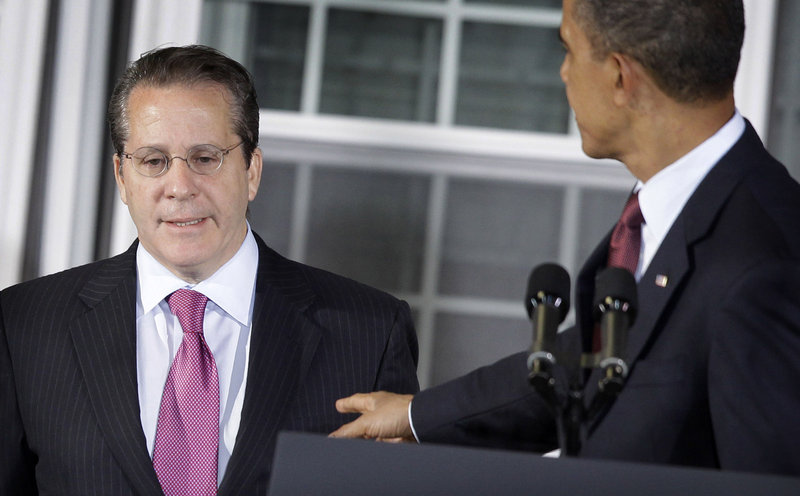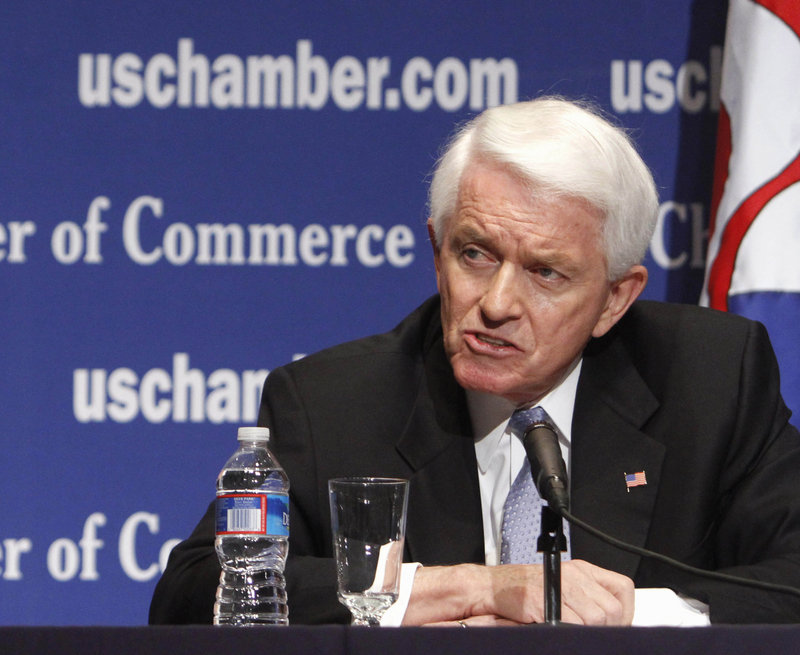WASHINGTON – The White House’s campaign to rebuild ties with corporate America gets the ultimate photo opportunity today when President Obama crosses Lafayette Park and steps into the imposing headquarters of the U.S. Chamber of Commerce.
The gesture may surprise Americans who recall that Obama, just four months ago, said the group may have used foreign money to air ads attacking Democrats, or that a senior aide called the chamber’s political tactics a “threat to our democracy.”
And the applause certain to fill the ornate Hall of Flags in the chamber building might seem jarring given the tens of millions of dollars the group spent to fight Obama’s signature health care overhaul and deliver the House majority to the Republicans.
Both sides are eager to show a new era of warm feelings, with the chamber in need of bipartisan bona fides and Obama seeking credibility with centrist voters and corporate donors as he ramps up his re-election campaign.
But today is also likely to show that tensions remain close to the surface.
Obama, even as he calls for cooperation on issues such as revamping the corporate tax code, passing a South Korea free-trade deal and fixing the nation’s schools, will reiterate his defense of the new restrictions on insurance companies that make up the core of the health care law that the chamber wants repealed. And he will implore corporations to spend profits that many are stockpiling.
Previewing his chamber remarks in his Saturday radio address, Obama said he will tell company executives that they have an “obligation” to “hire our workers, and pay decent wages, and invest in the future of this nation.”
Chamber officials, meanwhile, say they still expect their campaign spending next year to exceed the group’s $50 million budget for 2010. They say their organization does not get involved in presidential politics. But if chamber spending follows the 2010 model, it will go almost entirely toward helping the GOP extend its House margin and possibly win control of the Senate.
“The chamber’s going to continue to make judgments on an issue-by-issue basis on what we think is best for the business community, and we’re not going to make trade-offs based on feel-good opportunities,” said Thomas Collamore, a chamber spokesman.
The dynamic was evident last month, when chamber President Thomas Donohue delivered his State of American Business address from the same stage where Obama will speak today. Donohue noted a “new tone” from the White House but skewered the health care law and a series of new greenhouse gas limits as bad for business.
“Uncertainty among companies, lenders and investors still abounds,” Donohue said. “There are many unanswered questions about regulations, taxes and other policies that must be addressed in order to unleash aggressive hiring by the private sector.”
It is not clear that Obama’s remarks today will answer many of those questions to Donohue’s satisfaction.
Still, Obama’s swift moves toward business since his party’s deep losses in the November midterms, however symbolic, have opened a door that may have otherwise been shut.
Donohue and other business leaders lauded the appointment, for example, of William Daley, a former chamber board member and JPMorgan Chase executive, as White House chief of staff.
The Daley appointment followed the December tax deal in which Obama agreed to extend for two years the George W. Bush-era cuts for every income level, including the wealthiest Americans. And last month, Obama ordered a broad review of environmental, health and safety regulations to weed out those that might hinder job creation.
Administration officials are closely coordinating with the chamber on a lobbying strategy for winning congressional support for the South Korea trade pact — an effort that will include orchestrated events in the home states and districts of undecided lawmakers.
The new director of Obama’s National Economic Council, Gene Sperling, paid a visit to the chamber shortly after his appointment last month to share a one-on-one lunch with Donohue.
Sperling told the chamber president that “he was looking forward to working with someone he can argue with at 10 a.m. and work with at 2 p.m.,” a White House official said on the condition of anonymity in order to discuss a private conversation.
The official added that two of Sperling’s first phone calls in his new post were placed to Donohue and Richard Trumka, president of the AFL-CIO.
Trumka and Donohue, meanwhile, issued a rare joint statement after Obama’s State of the Union speech, lauding the president’s call for greater spending on infrastructure projects — a rare point of agreement between business and labor and a likely point of focus for Obama today.
Still, Obama’s business outreach has aroused some concern among his allies in the labor movement and other liberals who fear that the president may abandon them in his pursuit of the political center.
Some consumer advocates charged that even suggesting regulations might hurt businesses ceded a key rhetorical point, as the GOP, working with the chamber, begins its push to roll back new curbs on carbon emissions imposed last month by the Environmental Protection Agency.
Most labor unions are vehemently opposed to the South Korea agreement, saying it will lead to further shifts of U.S. jobs to plants overseas.
“A tiger doesn’t change its stripes, and the U.S. chamber doesn’t stop working for the corporations that fund its bottom line,” said Christy Setzer, spokeswoman for the union-backed group U.S. Chamber Watch.
Business lobbyists, too, are watching the White House-chamber courtship with a degree of skepticism.
Obama, for example, wants to reduce corporate tax rates while eliminating many deductions. Corporations want lower tax rates but not fewer deductions.
Daley suggested last week that the president has been walking a political tightrope with businesspeople but would win them back with substance.
“All you want from any constituent group like that is respect and a belief that you’re trying to do the right thing. And if they don’t like your rhetoric or they think you’re picking on them, you know, sometimes you have to pick on them,” Daley said.
Send questions/comments to the editors.




Success. Please wait for the page to reload. If the page does not reload within 5 seconds, please refresh the page.
Enter your email and password to access comments.
Hi, to comment on stories you must . This profile is in addition to your subscription and website login.
Already have a commenting profile? .
Invalid username/password.
Please check your email to confirm and complete your registration.
Only subscribers are eligible to post comments. Please subscribe or login first for digital access. Here’s why.
Use the form below to reset your password. When you've submitted your account email, we will send an email with a reset code.